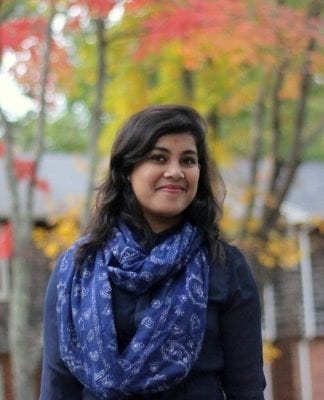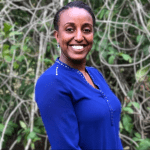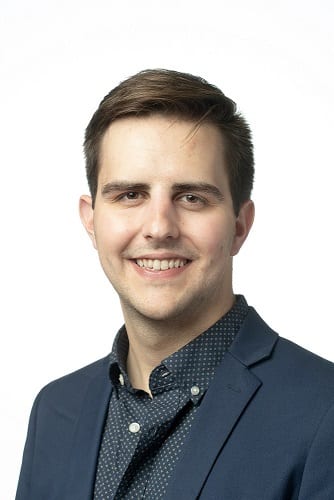In March 2020, the Water & Food Security PIRE was in its fourth year developing and communicating seasonal forecasts with our communities in Ethiopia and learning more each month about the relationships between scientists, farmers, officials and other stakeholders in this process. Then like elsewhere in the world, we were hit by the unlikely and unfortunate: the COVID-19 pandemic. The pandemic, which forced universities and businesses to go remote or shut down left the research team—a highly international as well as interdisciplinary group—to try our level best to contribute to our shared goals. We asked four researchers how Covid-19 has affected them: Kristen Kirksey, Rehenuma Lazin, Selam Negatu, and Jonathan Lala.
Kristen Kirksey
PhD student, Sociology, UConn.
My research and travel have been significantly affected due to COVID-19, and it has required a good bit of flexibility and creativity! As part of the social science team, I was scheduled to be in Ethiopia from March-June 2020, to assist with wet season forecast communication, as well as to collect data for my own dissertation. I left the U.S. for Ethiopia on March 2. At that time, there were just 100 confirmed cases of coronavirus in the U.S. and no cases in Ethiopia. The U.S. had implemented travel warnings for a handful of countries, including mainland China, Iran, South Korea, and Italy. Before leaving the U.S., I bought a bunch of hand sanitizer, an N-95 mask, and stocked up on over the counter medicines, just in case. But overall, I wasn’t too worried. Things changed quickly. I stayed in Ethiopia for about 10 days before returning to the U.S. I had barely overcome my jet lag, and I didn’t even make it out of Bahir Dar to our field sites. During my short time in Ethiopia, coronavirus cases in the U.S. began to surge, Ethiopia reported its first cases, and the WHO declared coronavirus a global pandemic. As the U.S. and other countries began expanding travel restrictions and closing borders, it felt urgent to return home. I worked with the travel office at UConn to get my return flight moved up and changed to a direct flight. After 2 days of delayed flights due to a sudden dust storm originating in the Sahara, I finally made it back to the U.S.
My social science colleagues in Ethiopia traveled from the field back to Addis Ababa shortly after I left. Ultimately, the forecast communication took place in an abbreviated format via phone, limiting its interactive components. In the weeks after returning home, I also reworked my dissertation, as it relied on interviews and other qualitative data collection in Ethiopia. I have been working closely with one of our partners, Dr. Muluken Azage, a professor at Bahir Dar University, and his graduate student, to collect the data remotely.
Currently, I am working from home in Virginia, and thanks to technology, I have been able to stay connected to my advisor, as well as my friends and colleagues on the Water & Food Security PIRE project who are working in various locations around the world. I am grateful that my position as a graduate research assistant has not been affected by the pandemic, and that my financial and living situation remain stable. My family and I have remained safe and healthy. Though my research was interrupted, in the grand scheme of things, it’s a minor bump in the road.
Rehenuma Lazin
PhD student, CEE, UConn
My role in the project is to perform the hydrological model simulations. Using the NOAA forecast data, I simulate the soil moisture conditions by maintaining water and energy balance in the hydrological model for the upcoming 7 months. Soil wetness information is an important parameter for cultivation and sowing, as well as for predicting crop yields. Apart from the forecast simulation for the bulletin, I perform the long term hydrological simulation for the past 40 years to analyze the trends of the hydrological components (Evapotranspiration, soil moisture, streamflow, etc.) in the Upper Blue Nile region in Ethiopia. Moreover, the outputs (infiltration, soil moisture, etc.) of my hydrological simulations are used in the sectoral models, such as the groundwater model (to estimate groundwater table) and crop yield model.
Luckily, my research has not been significantly affected by the pandemic. I am currently staying at my home in Willington, Connecticut, which is around 3 miles from the school. I did not have any plan to travel to Ethiopia or anywhere else during the fall semester, so I have not faced any travel restrictions for COVID-19. I have been working for almost 3 months from home. Since a major part of my research is simulation-based, and all the data I need are available online. We attend all the meetings through WebEx or Zoom and discuss our progress and concerns regarding research. Thank goodness for technology!! But I definitely miss my lab mates, working and laughing together, solving problems immediately whenever anyone is stuck at any point. Now, we communicate more through emails. Since everyone is very responsive, we can eventually solve the problems.
This pandemic reminds me of the phrase Health is wealth. We cannot take everything for granted, and we should appreciate every little thing in our lives. I cannot imagine the suffering of those who have gone through the pain caused by the virus and who lost their loved ones. May we all have the patience and strength to overcome this crisis.
Selam Negatu
PhD student, Sociology, UConn
My research has definitely been interrupted by COVID-19. I am part of the social science team, and since January, I had been living near our field sites in Dangila, Ethiopia. I had been doing some follow up interviews for the project, preparing for the dry season forecast dissemination, and carrying out interviews for my own dissertation about women’s empowerment in agriculture. Around mid-March, as Ethiopia saw its first COVID case, and the country began its lockdown, I decided to return home to Addis Ababa to be with my family.
Ezana, another social science graduate student, and I worked together to adapt the rainy season forecast communication activities from an interactive, in-person format to a format that we could carry out remotely. First, the forecast and companion documents were shared with our contact at the Dangila woreda agricultural office. He then set up meetings with the head of the woreda agriculture office, crop expert, irrigation expert and extension workers from Gaita and Dangishta kebeles. The participants looked over the forecast documents and discussed amongst themselves to compile questions and comments on the forecast bulletin. Ezana and I then called in to the meeting via phone, and while on speaker phone, we addressed their questions and comments. The following week, we carried out a similar meeting with our partners in Mecha woreda. It wasn’t ideal, but ultimately, I think it was effective. I’m glad that our team and our partners have remained flexible, positive, and committed to the project.
Jonathan Lala
PhD student, CEE, UW-Madison
My role in the PIRE project is predicting the timing [as opposed to the intensity] of the rainy season and seeing how that may affect crop yields and overall economic growth. I’ve published the prediction piece and am currently working with Meijian (UConn PhD student) on the yield piece and Liang on the economic piece.
Right now, I’m staying with my parents near Sacramento, CA. Unfortunately, my plans to attend the European Geosciences Union conference in Vienna in May were canceled due to COVID-19, along with some personal travel plans. UW Madison will be reopening for the fall, with some restrictions, so I will be heading back to Madison in July.
Fortunately, my research hasn’t been affected since it’s all computational. I already do all my work from my personal laptop. The only challenge regarding my research is that I’m much less productive at home than I would be at the office or a coffee shop! I’ve learned that I’m very fortunate to be doing a PhD right now, since I have job security and can still do my work from home!



